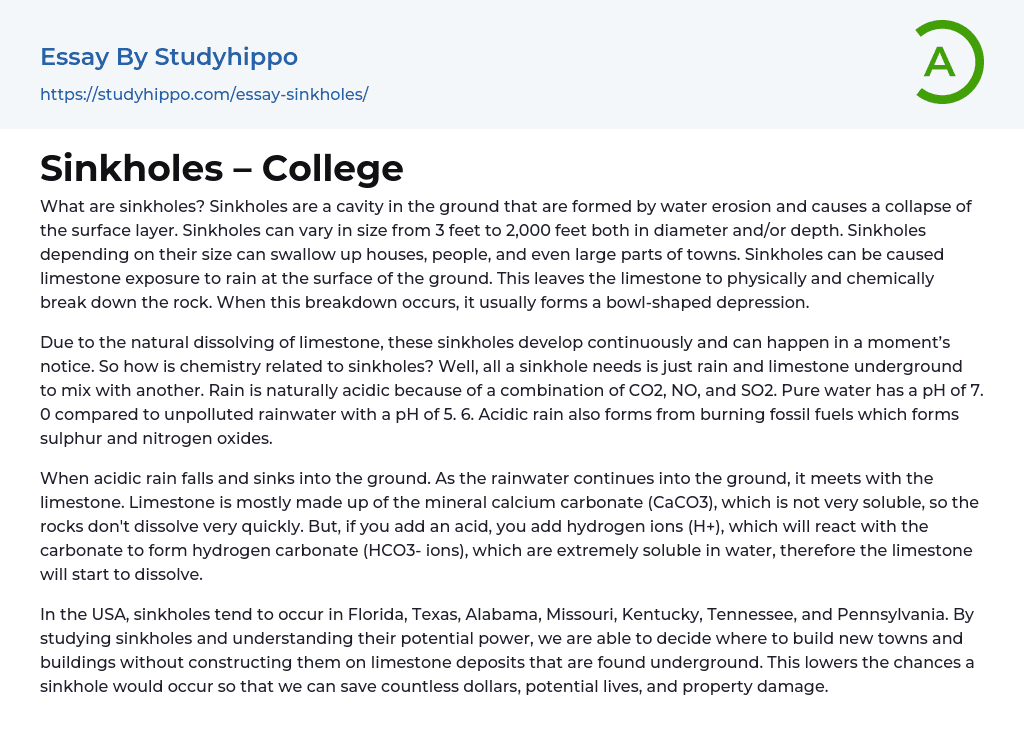What are sinkholes? Sinkholes are a cavity in the ground that are formed by water erosion and causes a collapse of the surface layer. Sinkholes can vary in size from 3 feet to 2,000 feet both in diameter and/or depth. Sinkholes depending on their size can swallow up houses, people, and even large parts of towns. Sinkholes can be caused limestone exposure to rain at the surface of the ground. This leaves the limestone to physically and chemically break down the rock. When this breakdown occurs, it usually forms a bowl-shaped depression.
Due to the natural dissolving of limestone, these sinkholes develop continuously and can happen in a moment’s notice. So how is chemistry related to sinkholes? Well, all a sinkhole needs is just rain and limestone underground to mix with another. Rain is
...naturally acidic because of a combination of CO2, NO, and SO2. Pure water has a pH of 7. 0 compared to unpolluted rainwater with a pH of 5. 6. Acidic rain also forms from burning fossil fuels which forms sulphur and nitrogen oxides.
When acidic rain falls and sinks into the ground. As the rainwater continues into the ground, it meets with the limestone. Limestone is mostly made up of the mineral calcium carbonate (CaCO3), which is not very soluble, so the rocks don't dissolve very quickly. But, if you add an acid, you add hydrogen ions (H+), which will react with the carbonate to form hydrogen carbonate (HCO3- ions), which are extremely soluble in water, therefore the limestone will start to dissolve.
In the USA, sinkholes tend to occur in Florida, Texas, Alabama, Missouri, Kentucky,
Tennessee, and Pennsylvania. By studying sinkholes and understanding their potential power, we are able to decide where to build new towns and buildings without constructing them on limestone deposits that are found underground. This lowers the chances a sinkhole would occur so that we can save countless dollars, potential lives, and property damage.
- Organic Chemistry essays
- Acid essays
- Calcium essays
- Chemical Bond essays
- Chemical Reaction essays
- Chromatography essays
- Ethanol essays
- Hydrogen essays
- Periodic Table essays
- Titration essays
- Chemical reactions essays
- Osmosis essays
- Carbohydrate essays
- Carbon essays
- Ph essays
- Diffusion essays
- Copper essays
- Salt essays
- Concentration essays
- Sodium essays
- Distillation essays
- Amylase essays
- Magnesium essays
- Acid Rain essays
- Professor essays
- Should College be Free essays
- Should college athletes be paid essays
- College Education essays
- College Tuition essays
- Graduation essays
- College Goals essays
- Personal Statement essays
- Online Classes Vs Traditional Classes essays
- Online Education essays
- Student Loan essays
- Study Abroad Scholarship essays
- Reasons To Go To College essays
- Paying College Athletes essays
- Technology In The Classroom essays
- Oxygen essays
- Atmosphere essays
- Coral Reef essays
- Desert essays
- Earth essays
- Ocean essays
- Lake essays
- Sea essays
- Biodiversity essays
- Natural Environment essays
- Forest essays




